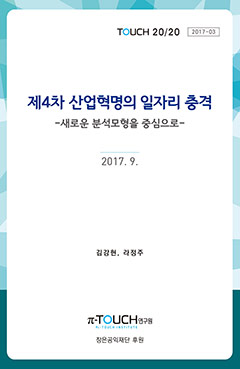 |
Title | Impact of the Fourth Industrial Revolution on Jobs - Focusing on A New Analysis Model |
|---|---|---|
| Writer | Kim, Kang Hyun & La, Jung Joo | |
| Date | 2017.10.10 | |
| Outline | The purpose of this study is to analyze the job change of the Fourth Industrial Revolution through macroeconomic analysis model and to propose policy implications based on the results of this analysis. |
![]() Impact of the Fourth Industrial Revolution on Jobs.pdf
Impact of the Fourth Industrial Revolution on Jobs.pdf
The purpose of this study is to analyze the job change of the Fourth Industrial Revolution through macroeconomic analysis model and to propose policy implications based on the results of this analysis.
Unlike the existing documents, this study has taken the following into consideration. First, the realm of jobs replaceable by computers have been expanded to include non-routine work. Second, a general equilibrium analysis has been conducted by not only considering technology level but also labor cost and automation cost.
The results of quantitative analysis using the data collected in Korea are as follows. First, if there is an increase of about 4.13% in production technology by computers that can replace human labor, the number of non-routine cognitive workers (e.g. engineers capable of designing softwares necessary in developing new products) would increase by 334,820 persons where as the number of routine workers (e.g. parts assembler at a factory) and non-routine manual workers (e.g. restaurant employees who come into direct interaction with customers) would decrease by 589,390 persons and 989,646 persons, respectively, in the next 20 years. Second, the results by age group show that the net decrease of workers over a 20 year period is the highest for 50-59 year-olds (349,312 persons) and the lowest for 15-29 year-olds (185,327 persons). Third, the wage gap between low-skilled, middle-skilled, and high-skilled workers would be widened. Fourth, an economic phenomenon called 'jobless growth’, where gross production is increased while total labor demand is decreased, is triggered.
Therefore, this study is proposing the following solutions as major policy alternatives. First, we should support career change for those workers being replaced by computers. For this purpose, we need to analyze the actual situations of vulnerable workers who are in danger of being replaced and present customized jobs for possible career change as well as providing social security services during the unemployment period. Furthermore, job training appropriate for the Fourth Industrial Revolution should be promoted in conjunction with the National Competency Standards (NCS), and career change to creative and social jobs should be supported. Second, the minimum wage system that takes the prospects of the Fourth Industrial Revolution into consideration should be applied. In the framework of the Fourth Industrial Revolution, the rapid increase in the minimum wage accelerates the automation of non-routine manual work, which is expected to decrease the most due to the replacement by computers. Therefore, the rapid increase in the minimum wage should be avoided in order to mitigate the impact of the Fourth Industrial Revolution on jobs. Third, we need to build an education system to foster non-routine cognitive workers who are demanded in the era of the Fourth Industrial Revolution. For this reason, the college entrance system must be drastically changed in the same direction as Sweden in order to cultivate creative intelligence and social intelligence.
| NO. | Title | Writer | Date | |
|---|---|---|---|---|
| # | Impact of the Fourth Industrial Revolution on Jobs - Focusing on A New Analysis Model Kim, Kang Hyun & La, Jung Joo / 2017.10.10 |
|||
| 3 | Directions for Regulatory Reforms in the Era of the Fourth Industrial Revolution Shim, Young Seop / 2017.10.10 |
|||
| 2 | The Effects of Inter-company Transactions of Large Corporations on National Economy La, Jung Joo / 2017.07.10 |
|||
| 1 | Article 119 of the Constitution - Focused on Fair Competition La, Jung Joo & Han, Won Suk / 2017.03.23 |